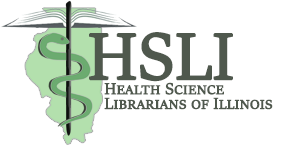(Note: This is an article that appeared in the Spring, 2016, issue of the IACRL Newsletter.)
Sandra De Groote, Professor and Scholarly Communications Librarian at the University of Illinois at Chicago, has won the Medical Library Association’s 2016 Ida and George Eliot Prize. The award recognizes a scholarly work that has had a significant impact on the advancement of medical librarianship. De Groote was recognized for a paper that she co-authored, “Examining the Impact of the National Institutes of Health Public Access Policy on Citation Rates of Journal Articles”, which appeared in Volume 10, Issue 10 (October 8, 2015), of PLoS One.
To read the full announcement, go here. Below, De Groote shares her thoughts on winning the award and the issues affecting scholarly communications in librarianship.
Congratulations on winning the MLA’s Ida and George Eliot Prize! What was your reaction to receiving the news?
It was a happy surprise, and I am quite honored that the paper was selected.
Have you known, or had a chance to work with, any of the previous winners?
While I don’t work with or know any of the previous winners personally, there are a number of previous winners whose names I am familiar with from following their research. It’s really an honor to have the paper placed among so many outstanding works.
In the article for which you received the award, what conclusions did you and your co- authors draw, regarding the NIH’s public-access policy and its effect on citation rates of journal articles?
The NIH-funded articles that complied with the NIH public-access policy (PAP) had significantly higher citation rates than the NIH funded articles that didn’t comply with the policy, even though the articles were all published in the same journals and in the same year. Compliance with the NIH PAP meant the articles were openly accessible. This suggests that openly-accessible articles are accessed more and cited more than articles available only through journal subscriptions.
How else have you been involved with the Medical Library Association?
MLA membership has been very meaningful in my career. I have been an active member since 1999 and have participated on commit- tees and juries. Currently, I am a member of the Research Section of MLA and have assisted in coordinating the judging of papers and posters at the MLA annual meet- ings for the past six or seven years. I also belong to AHIP (Academy of Health Information Professionals), which is MLA’s professional- development and career recognition program.
What issues or challenges related to scholarly communications do you believe academic librarians will have to face in the near future?
Academic librarians are becoming more involved in scholarly communications, supporting greater as- pects of it that surround university research. This means librarians not only need to understand the subject-based resources that their patrons use to find information, but they also need to know about broader matters, such as data-management issues, federal open-access policies (such as the NIH public-access policy), and data-sharing requirements. These evolving roles of academic librarians do have their challenges, but they are also rewarding, as they provide opportunities for growth and collaboration with the broader academic community.
Technology also allows for new forms and ways for the dissemination and assessment of scholarly information. One unknown is what impact researchers’ adoption of Google Scholar will have, as many scholars now report starting their searches in Google Scholar. So far, they use it just to get started, but does it mean they will eventually rely on it instead of the A&I (indexing and abstracting) tools licensed by libraries, which allow for more precision when retrieving search results?
I don’t know what different challenges we will face, but I believe it is certainly an exciting time in the scholarly-communications arena, as things are changing and evolving.
